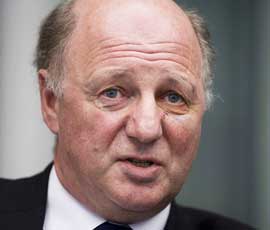Ministers to meet over milk prices

Farm minister Jim Paice is to meet his counterparts from Scotland and Wales to discuss the crisis that has engulfed Britain’s dairy sector. Speaking in the House of Commons, Mr Paice said he would meet ministers from the devolved administrations ahead of the Royal Welsh Show (23-26 July). Mr Paice appeared keen to play down calls by Scotland rural affairs secretary Richard Lochhead for a ministerial summit ahead of the Builth Wells event. “We were going to get together anyway to discuss CAP issues,” Mr Paice told an adjournment debate on Tuesday (17 July). “We will also discuss the situation in the dairy sector.” His comments came on a day that saw concessions on milk prices and contracts offered to farmers by Asda and Dairy Crest. Asda announced a 2p per litre increase in the premium paid to 272 farmers who supply the retailer with milk direct. Meanwhile, Dairy Crest said it would allow farmers to walk away from contracts with three months notice, rather than having to serve a year. But farm leaders said the deals were not enough to avert direct action against retailers and processors. Mr Paice said the big problem faced by farmers was absurd levels of price cutting by retailers – especially those in the so-called “middle ground”. One retailer was openly selling milk at 99p for four pints, he told MPs. “That sort of price is completely unsustainable. Retailers like that need to understand that if they want to go on like that then there will be no milk.” Mindful perhaps of the way he was booed last week when urging farmers to check production costs, Mr Paice acknowledged there was a limit to the cost-cutting farmers could carry out. “Maybe some producers can cut their costs but they cannot cut it back to that level – it’s just completely impossible,” he warned. “There is no country in the world that can sell bottled milk at the equivalent of 25p per pint by the time it has gone through the whole processing chain.” “It is absurd.” On the subject of milk contracts, Mr Paice repeated his view that a voluntary code of practice offered a better prospect than legislation to ensure a fair deal for farmers. A voluntary code could cover issues such as price, notice period, length of contract, volume, exclusivity, he said – and whole load of other issues if both sides agreed. European rules permitted the government to legislate to make contracts compulsory, Mr Paice acknowledged. But the same legislation limited what could be included, he insisted. “There is no notice period, as we understand it, permitted. “It would be a length of contract, which probably would be a year plus, so the idea of a short notice to get out of a contract would not exist.” This was just one example where the regulatory route was not as good as the range of measures that could be accommodated within a code. Mr Paice said he fully agreed with farmers who said talks about a voluntary code had been going on for 14 months and they couldn’t go on hoping it would happen. “It is my intention now to say that enough is enough – that we have had these negotiations for long enough,” said Mr Paice. “It is time for both sides of the industry to show some maturity and to demonstrate that they can come together and agree a voluntary code of practice.” Mr Paice said he would be foolish to pretend it was certain an agreement would be reached. “There are still some stumbling blocks on both sides – both from those representing producers and from at least one of the major processors. “But I have every intention of driving it forward and getting a result.”
